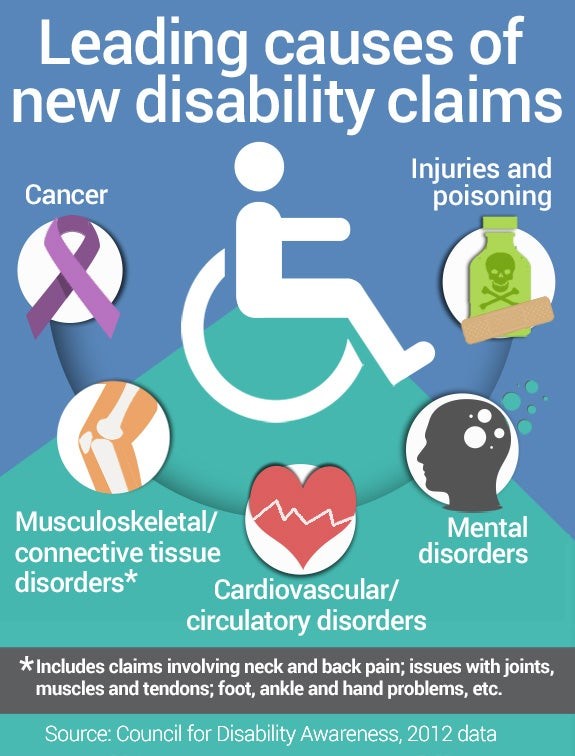
Leading Causes of Disability
A disability impairs a person’s functioning and may result from one of these ten leading causes.
According to the Centers for Diseases and Prevention, a disability is a physical or mental condition that makes it difficult for a person to undertake activities and interact with the environment.
More than one in every four U.S. citizens aged 18 to 64 years has a disability. These people have difficulties:
- Walking
- Climbing stairs
- Hearing
- Seeing
- Focusing
- Remembering
- Making decisions
Individuals with impairments are prone to suffer heart disease, stroke, diabetes, or cancer more often than adults without disabilities.
Aerobic physical exercise can help minimize the effect of chronic conditions. However, about half of all people with disabilities do not engage in any aerobic physical activity.
10 leading causes of disabilities
- Arthritis
- Arthritis is a condition where the joints swell and cause pain with movement. It is the most common cause of disability.
- In severe arthritis cases, joints may be restricted, leading to dependence on a wheelchair.
- There are various types of arthritis, including:
- Osteoarthritis: Caused by wear and tear of the cartilage.
- Rheumatoid arthritis: An inflammatory disease affecting joints.
- Psoriatic arthritis: Affecting people with psoriasis.
- Juvenile arthritis: Inflammation and swelling of joints in children.
- Back pain
- Back pain is a frequent issue, impacting many people. It can range from a subtle, continuous aching to acute, stabbing pain.
- Pain is often not caused by anything major and will go away on its own. Treatment options include:
- Hot or cold packs
- Exercise
- Medications
- Complementary therapies, such as physiotherapy and massages
- Surgery
- Ischemic heart disease
- Ischemic heart disease is a frequent type of heart disease and the most common cause of a heart attack.
- This condition is caused by the accumulation of cholesterol particles in the arteries that carry blood to the heart muscle. Plaques may form, leading to inflammation.
- Abnormalities seen in people with ischemic heart disease include breathlessness, inability to walk for prolonged hours, and fatigue.
- Treatment options include medications, lifestyle modifications, and surgery.
- Depression
- Depression is a leading cause of disability. It is a mood illness that causes regular feelings of unhappiness or disinterest in life.
- Acute depression, including feelings of helplessness and worthlessness, can last for weeks and prevent the person from living their life.
- There is no complete cure for depression, but with proper care and treatment, the person can achieve remission and live a healthy life.
- Cancer
- Cancer is a common word that refers to a wide range of illnesses. Abnormal cells develop and spread beyond their normal borders, leading to disability.
- The leading cause of cancer disability is widespread metastasis.
- Stroke
- Stroke is a cause of long-term disability, with effects dependent on the location and extent of the brain damage.
- The most common impairments following a stroke include speech, limited physical abilities, weakness or paralysis of limbs, difficulties with grasping or holding items, and delayed communication.
- Early treatment and rehabilitation can increase recovery and allow many people to regain abilities.
- Alzheimer’s
- Alzheimer’s is the most common cause of dementia, causing a deterioration in brain function.
- Alzheimer’s disease has no cure, but supportive treatment may help relieve symptoms.
- Chronic obstructive pulmonary disease (COPD)
- COPD is a chronic lung disease that affects people worldwide.
- Emphysema and chronic bronchitis are common forms of COPD.
- Abnormalities in the airways restrict airflow and cause symptoms like cough, wheezing, and difficulty breathing.
- COPD and asthma share similar symptoms, and people may have both conditions.
- Diabetes mellitus
- Diabetes mellitus is a serious global public health issue, causing disabilities due to high blood glucose levels.
- Early detection and timely treatment with appropriate medications may delay organ damage and prevent mortality.
- Kidney diseases
- Chronic kidney disease (CKD) is becoming a global public health burden, with most patients advancing to end-stage renal disease (ESRD).
- Severe cases of CKD and ESRD require dialysis or kidney transplantation to prolong life expectancy.


